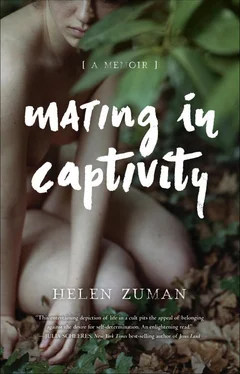EXACTLY WHY HAD I APPLIED for a job moving cargo by giant trike in the heart of Manhattan?
It was the morning of Friday, September 26, 2008—just one day short of the fourth anniversary of my flight from Zendik—and I was set to meet a prospective employer at his shop by Penn Station in a few hours. I’d all but decided not to show.
Once, in 1999, I’d biked from Park Slope to the far side of the Brooklyn Bridge. At the end of the promenade, I’d stopped, stared at the swarm of hulks I was supposed to share the road with, and turned tail for home.
I’d shrunk from city cycling ever since.
But I needed the money. And operating a vehicle so new to New York that I’d yet to spot one tickled my sense of adventure.
Plus, there was the save-the-world angle. The trikes, rated for loads of more than a quarter ton, could cut pollution and fossil-fuel use by shifting runs away from vans and trucks. Post-Zendik, I favored local action over visions of global renewal. Just a day earlier, I’d cheered the Yes Men as they dropped torn pillows, worn suits, and broken electronics at the rump of the Charging Bull, demanding government payments—commensurate with what the big banks would get, should TARP pass Congress—for their “troubled assets.” Then I joined a mob at the Stock Exchange, chanting, “You broke it, you bought it! The bailout is bullshit!” In the midst of the protest, Gregg, the owner of the trike business, had called to arrange the interview.
I turned on my laptop and pulled up the company’s website, hoping for a nudge toward yes or no.
I clicked from tab to tab, skimming text about pedicab sales and rentals, special-event shuttles, sightseeing tours, ad campaigns. No nudges there. Then, on the freight page, I noticed a small, grainy photograph of a man loading boxes into a cargo bay. I leaned in for a closer look. The man looked familiar. He looked like Jul—a fellow ex-Zendik.
Jul had moved to the Farm a couple years before me. Though he’d already achieved Kore status by the time I arrived, I’d known him to be humble and kind. I remembered how pleased he’d been, on a big demolition job, when my zeal for board sorting had freed him to tend other nodes in the flow from crowbar to truck. And I recalled a plea he’d made in a meeting, for a shift from ripping each other apart to appreciating our many strengths and contributions. (Arol, amused but unmoved, had urged him to go ahead and do all the appreciating he wanted—he could be the Farm’s appreciator in chief.) Our tenures at the Farm had overlapped by about a year and a half; he’d left in 2001.
My eyes dropped to the faint gray caption beneath the image: “Julian Isaza, Director of Operations.”
Yes, I’d keep my appointment. I wished to see Julian.
Within a few hours, we were sitting together, waiting for Gregg, in a nearly empty, dimly lit storefront across from a Lincoln Tunnel approach on West Thirty-First Street. The rickshaw company was moving here, from a space a few blocks away on Ninth Avenue.
Though Julian hadn’t known of my application, he hadn’t been astonished to see me. From my blog, he’d learned of my return to Brooklyn and my story of Zendik as cult—which didn’t mesh with his respect for who he’d become in the Farm’s crucible. He’d trusted our paths would cross at the right time.
He’d told me all this within moments of hugging me hello. Expecting Gregg any minute, we raced to catch up.
As my eyes adjusted to the low light, something tacked to the corkboard behind Julian’s head came into focus and gave me a jolt. Something black, white, and all too familiar—a STOP BITCHING START A REVOLUTION bumper sticker. Nodding toward it, I asked Julian, with a hint of sarcasm, “Did you post that? To bring back the good old days?”
He swiveled to look at the corkboard. “No,” he said. “That’s Gregg’s. He got it from some Zendik he met on the street.” He smiled. “It’s a perfect match, yeah?”
“It sure is.” The business was called Revolution Rickshaws—RR for short. Or Revolution. Gregg had started Revolution.
From the rumble of his voice on the phone and my stereotypes about small-business owners, I’d formed a picture of Gregg that didn’t flatter him: I saw a paunch straining against a stained button-down shirt, a bald spot poorly concealed by a comb-over, skin roughened and grayed by tumult and soot.
So I was surprised when Julian said, “Hi, Gregg!” to a trim, sturdy young man with pink cheeks and thick curls, stepping through the back door. He wore soccer flats, shorts, and a short-sleeved sports jersey. His shorts showed off his powerful quads and calves—a by-product of pedicabbing passengers around Midtown during the evening rush. Julian introduced me to him, mentioning our link through Zendik. Gregg wiped his fogged glasses on the hem of his shirt. “Welcome,” he said.
As Gregg laid out the demands of the delivery job—hauling heavy loads through heat, cold, rain, and snow; handling aggressive motorists; negotiating pickups and drop-offs (notoriously tricky in Midtown office buildings)—Julian vouched for my grit and social skill. Couriers also needed to know the streets.
“Do you know your way around the city?” Gregg asked.
“Of course. I grew up here.”
“Okay. How about if you come back Monday?” A veteran driver would train me to ride the trike in the RR parking lot; then Gregg would take me out for a road test.
On Monday afternoon, after I’d mastered the basics, Gregg glided through the gate on his Brompton, looking sharp in wingtips, slacks, and a dress shirt. He flipped the bike’s rear wheel forward to park it and pulled out one of the pedicabs lined up along the fence. He hadn’t worn shorts because he’d be in the passenger seat. I’d be driving.
Feigning calm, I pedaled, as directed, up Eighth Avenue to Thirty-Sixth Street and turned east.
“Now go back to Thirty-First.”
“Does Broadway go south? Or should I take Seventh?”
“I thought you knew your way around,” he said, teasing me for my I’m-a-New-Yorker arrogance.
“I do. But there’s no such thing as a one-way sidewalk.”
Back at RR, Gregg cleared me for the next step toward employment—filling out W-4 and I-9 forms at the old shop on Ninth Avenue. He released his bike from park and grabbed the handlebars. “I’ll walk over with you.”
On the way, one of us—probably me—brought up the bailout. A House vote on TARP had been set for that afternoon, and I’d adopted the view of writers on sites like Prison Planet and Blacklisted News that its true purpose was to speed the country toward tyranny by grabbing power for President Bush and his cabal. It had to fail.
At the shop, Gregg slid into a seat behind the office iMac and pulled up a news article on the vote. “The House of Representatives rejected the bailout package, two-twenty-eight to two-oh-five,” he read.
“Yes!” I said.
His eyes continued across the screen. “An hour later, President Bush and his entire cabinet were seen boarding a plane to Toronto.”
“What? Really?”
A smile tugged at his mouth. His gaze stayed on the screen. “Bush said he feared for his life, now that his fascist ambitions had been exposed. A rotten tomato hit him in the back as he stepped through a metal detector.”
The smile won out. When his eyes met mine, they twinkled with mischief.
“You’re kidding,” I said, smiling back.
“Yeah.” He glanced down at the keyboard, in mock contrition. “I made up the part about the tomato.”
That was the first time Gregg made me laugh.
In late October, a month into my stint at RR, Gregg—as president of the New York City Pedicab Owners’ Association—received a couple dozen complimentary passes to a preview of Cirque du Soleil’s Wintuk , at Madison Square Garden. Enticed by the promise of stunning acrobatics—if repelled by the holiday theme—I accepted his offer of a ticket. He paused to study the sheaf in his hand before picking one to give me.
Читать дальше











